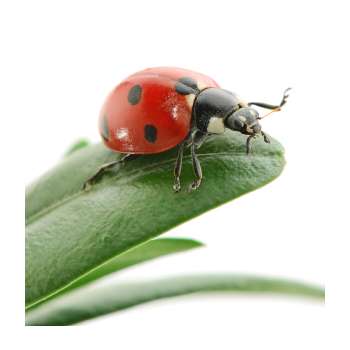By its simplest definition, biodiversity is the variety of life on Earth, from invisible microbes to plant and animal species to our own genetics.1 2 It's the heartbeat of ecosystem stability and resilience—it’s fundamental to life as we know it.3 4 And a new study finds that biodiversity also plays "a critical role" in mental wellbeing, especially in cities.5 While urban living has its conveniences, anxiety and depression rates are high, and studies show links between city life and a greater incidence of mental illness; however, the risk for developing anxiety or depression is 71 percent lower for city dwellers who live near green spaces.6 7 8 Now, a team of researchers from King's College London is deepening our understanding of nature's impact on mental wellbeing by posing a not-so-frequently-asked question: How much does the level of biodiversity within green spaces matter to mental health?9 10 As it turns out, quite a lot.
The King's College team conducted a peer-reviewed study using data from 41,000 self-reported assessments of participants' environment and mental state throughout the day, gathered through the Urban Mind app.11 Researchers aimed to determine whether spaces with an abundance of natural features such as plants, waterways, wildlife, and trees would have a greater positive impact on mental health than those with less diversity.12 The results were significant—users attributed almost 25 percent of green space benefits to natural diversity, and these positive effects lasted for up to eight hours.13 14 Prior research supports these findings; however, unlike earlier studies, the King's College study is unique in using real-time data.15 16
Among the many ways biodiversity may benefit mental health, sensory stimulation stands out—it may improve concentration, reduce mental fatigue, and support memory and attention span.17 Additionally, natural diversity can enhance the function of the surrounding environment; for example, green spaces with higher plant diversity may have more potential to mitigate air pollution and regulate temperature.18 19 A wider variety of natural environmental microbiota may also provide protective support for allergies and asthma.20
The King's College study broadly defined biodiversity for its participants in categories such as trees, plants, birds, and water.21 Consequently, as the researchers point out, participation didn't require advanced biodiversity identification skills.22 They also note that residents of developed countries are more limited in identifying biodiversity—a disconnect that could be valuable to consider in conservation strategies.23 24 This is an important point because we are at a moment in time when effective conservation strategies are critical.
The variety of life on earth is in jeopardy, more than ever before in our lifetimes,25 26 27 but the beauty of biodiversity is that it's also resilient.28 29 30 No action toward restoring it is too small, from our food choices (industrialized agriculture is a primary driver of biodiversity loss) to cultivating our own green spaces, from neighborhood parks to backyard gardens.31 32
So perhaps the place to begin is by making the question personal—why does biodiversity matter to me? What does the world look like without the colorful chaos of spring wildflowers? How does it sound without birdsong in the morning or crickets on a warm summer evening? How does it smell devoid of basil, mint, or oregano to crush between your fingers? How does it taste without heirloom varieties of apples, tomatoes, or corn? How does it feel without being able to dig your hands into the soil? What would change if we asked these questions daily?
References
- Conversation. (2024, May 1). Study Links Nature's Diversity to Mental Health : ScienceAlert. ScienceAlert. https://www.sciencealert.com/study-links-natures-diversity-to-mental-he…
- Aerts, R., Honnay, O., & Van Nieuwenhuyse, A. (n.d.). Biodiversity and human health: mechanisms and evidence of the positive health effects of diversity in nature and green spaces. British Medical Bulletin, 127(1), 5–22. https://doi.org/10.1093/bmb/ldy021
- Why is biodiversity important? (n.d.). https://royalsociety.org/. Retrieved July 24, 2024, from https://royalsociety.org/news-resources/projects/biodiversity/why-is-bi…
- Why is biodiversity important? (n.d.). https://royalsociety.org/. Retrieved July 24, 2024, from https://royalsociety.org/news-resources/projects/biodiversity/why-is-bi…
- Conversation. (2024, May 1). Study Links Nature's Diversity to Mental Health : ScienceAlert. ScienceAlert. https://www.sciencealert.com/study-links-natures-diversity-to-mental-he…
- Myers, Z. (n.d.). Biodiversity and our brains: how ecology and mental health go together in our cities. The Conversation. https://theconversation.com/biodiversity-and-our-brains-how-ecology-and…
- Hammoud, R., Tognin, S., Smythe, M., Gibbons, J., Davidson, N., Bakolis, I., & Mechelli, A. (Accepted/In press). Smartphone-based ecological momentary assessment reveals an incremental association between natural diversity and mental wellbeing. Scientific Reports.
- Conversation. (2024, May 1). Study Links Nature's Diversity to Mental Health : ScienceAlert. ScienceAlert. https://www.sciencealert.com/study-links-natures-diversity-to-mental-he…
- Conversation. (2024, May 1). Study Links Nature's Diversity to Mental Health : ScienceAlert. ScienceAlert. https://www.sciencealert.com/study-links-natures-diversity-to-mental-he…
- Hammoud, R., Tognin, S., Smythe, M., Gibbons, J., Davidson, N., Bakolis, I., & Mechelli, A. (Accepted/In press). Smartphone-based ecological momentary assessment reveals an incremental association between natural diversity and mental wellbeing. Scientific Reports.
- Conversation. (2024, May 1). Study Links Nature's Diversity to Mental Health : ScienceAlert. ScienceAlert. https://www.sciencealert.com/study-links-natures-diversity-to-mental-he…
- Conversation. (2024, May 1). Study Links Nature's Diversity to Mental Health : ScienceAlert. ScienceAlert. https://www.sciencealert.com/study-links-natures-diversity-to-mental-he…
- Conversation. (2024, May 1). Study Links Nature's Diversity to Mental Health : ScienceAlert. ScienceAlert. https://www.sciencealert.com/study-links-natures-diversity-to-mental-he…
- Hammoud, R., Tognin, S., Smythe, M., Gibbons, J., Davidson, N., Bakolis, I., & Mechelli, A. (Accepted/In press). Smartphone-based ecological momentary assessment reveals an incremental association between natural diversity and mental wellbeing. Scientific Reports.
- X, S. (2021, March 31). Biodiversity is positively related to mental health. Phys Org. https://phys.org/news/2021-03-biodiversity-positively-mental-health.html
- Hammoud, R., Tognin, S., Smythe, M., Gibbons, J., Davidson, N., Bakolis, I., & Mechelli, A. (Accepted/In press). Smartphone-based ecological momentary assessment reveals an incremental association between natural diversity and mental wellbeing. Scientific Reports.
- Conversation. (2024, May 1). Study Links Nature's Diversity to Mental Health : ScienceAlert. ScienceAlert. https://www.sciencealert.com/study-links-natures-diversity-to-mental-he…
- Conversation. (2024, May 1). Study Links Nature's Diversity to Mental Health : ScienceAlert. ScienceAlert. https://www.sciencealert.com/study-links-natures-diversity-to-mental-he…
- Aerts, R., Honnay, O., & Van Nieuwenhuyse, A. (n.d.). Biodiversity and human health: mechanisms and evidence of the positive health effects of diversity in nature and green spaces. British Medical Bulletin, 127(1), 5–22. https://doi.org/10.1093/bmb/ldy021
- Aerts, R., Honnay, O., & Van Nieuwenhuyse, A. (n.d.). Biodiversity and human health: mechanisms and evidence of the positive health effects of diversity in nature and green spaces. British Medical Bulletin, 127(1), 5–22. https://doi.org/10.1093/bmb/ldy021
- Hammoud, R., Tognin, S., Smythe, M., Gibbons, J., Davidson, N., Bakolis, I., & Mechelli, A. (Accepted/In press). Smartphone-based ecological momentary assessment reveals an incremental association between natural diversity and mental wellbeing. Scientific Reports.
- Hammoud, R., Tognin, S., Smythe, M., Gibbons, J., Davidson, N., Bakolis, I., & Mechelli, A. (Accepted/In press). Smartphone-based ecological momentary assessment reveals an incremental association between natural diversity and mental wellbeing. Scientific Reports.
- Hammoud, R., Tognin, S., Smythe, M., Gibbons, J., Davidson, N., Bakolis, I., & Mechelli, A. (Accepted/In press). Smartphone-based ecological momentary assessment reveals an incremental association between natural diversity and mental wellbeing. Scientific Reports.
- Cianconi, P., Hirsch, D., Chiappini, S., Martinotti, G., & Janiri, L. (2022b). Climate change, biodiversity loss and mental health: a global perspective. BJPsych International, 19(4), 83–86. https://doi.org/10.1192/bji.2022.20
- Lindner, J. (2024). GITNUX REPORT 2024 Global Biodiversity Statistics: $125 Trillion Ecosystem Value Threatened by Extinction. In https://gitnux.org/. https://gitnux.org/biodiversity-statistics/
- Cianconi, P., Hirsch, D., Chiappini, S., Martinotti, G., & Janiri, L. (2022b). Climate change, biodiversity loss and mental health: a global perspective. BJPsych International, 19(4), 83–86. https://doi.org/10.1192/bji.2022.20
- Lai, O. (2023, December 28). 5 biggest causes of biodiversity loss. Earth.Org. https://earth.org/causes-of-biodiversity-loss/
- United Nations Environment Programme. (n.d.-a). Here’s how five countries are reviving biodiversity. UNEP. https://www.unep.org/news-and-stories/story/heres-how-five-countries-ar…
- Lindner, J. (2024). GITNUX REPORT 2024 Global Biodiversity Statistics: $125 Trillion Ecosystem Value Threatened by Extinction. In https://gitnux.org/. https://gitnux.org/biodiversity-statistics/
- Savory Institute. (2020, July 21). Regenerative Agriculture: Enhancing biodiversity for the future. https://savory.global/regenerative-agriculture-enhance-biodiversity-far…
- United Nations Environment Programme. (n.d.-a). Five drivers of the nature crisis. UNEP. https://www.unep.org/news-and-stories/story/five-drivers-nature-crisis
- United Nations Environment Programme. (n.d.-a). A beginner’s guide to ecosystem restoration. UNEP. https://www.unep.org/news-and-stories/story/beginners-guide-ecosystem-r…








